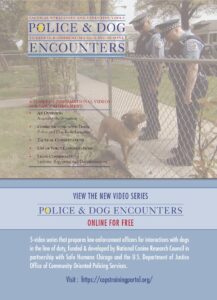Resources designed to prepare law enforcement for encounters with dogs while on duty






National Canine Research Council funded research for the report by the National Police Foundation, in partnership with the spcaLA. The 2019 report, “An Evidence-Based Approach to Reducing Dog Shootings in Routine Police Encounters: Regulations, Policies, Practices, and Training Implications” sheds light on the critical issue of shootings by law enforcement of pet dogs in routine police encounters.
The reported results include the following four crucial points that law enforcement officers should know in order to handle dog encounters safely:
Police and Dog Encounters is a resource that:
For additional information on the video series, please read “When Police and Dogs Meet”:
The Video Series Police and Dog Encounters is available online for FREE in English and Spanish via the U.S. Department of Justice: Office of Community Oriented Policing Services Training Portal Website: https://copstrainingportal.org/
Please note that you will need to make an account to access the series via the training portal online.
Law enforcement agencies may also request free DVD copies of the video series (in English only) through the National Canine Research Council Contact Page.

This manual for law enforcement officers is a publication of the U.S. Department of Justice: Office of Community Oriented Policing Services. This collaborative manual was authored by National Canine Research Council, Best Friends Animal Society, Safe Humane Chicago, and the University of Illinois Center for Public Safety and Justice.
The Problem of Dog-Related Incidents and Encounters offers a valuable framework for effective response strategies to any situation where a dog is present. Officers learn how to assess a dog’s environment, distinguish between warning signals and signs of friendliness, and which of their actions can calm a tense, uncertain situation. The authors illustrate their points with drawings and photographs of a variety of common canine postures and also include case studies to reinforce the recommendations for best practices. In addition to discussing how to maintain appropriate control when encountering a dog, special instructions are included for those who evaluate and report on dog-related incidents.